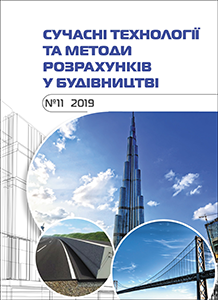Determination of temperature of crystals of modified bitumes and changes of their properties after programming
DOI:
https://doi.org/10.36910/6775-2410-6208-2019-1(11)-25Keywords:
bitumen, modified bitumen, additive, temperature of the fragility, outbreak temperature, plasticity intervalAbstract
The temperature of brittleness is the temperature at which bitumen passes from the viscoelastic to the fragile state and in the layer of bitumen, applied to the steel plate and cooled at a constant constant speed, with crackling folds. By its very nature, the degree of fragility to some extent can be regarded as the temperature of the transition of bitumen to vitreous state, in which the viscosity of all amorphous materials is close to 1012 Pa. At the same time, it is believed that the temperature of brittleness is the temperature at which the penetration of different bitumen, having a predominantly "sol" structure, is 1.25 × 0.1 mm.
When the temperature of the fragility reaches the structure of the bitumen changes qualitatively - the freezing of the components of its high-molecular combinations, the consolidation of Associates asphaltenic complexes, resulting in substantially changing the structural and mechanical properties of bitumen. The value of the temperature of the fragility of the bitumen can predict its behavior and behavior of materials based on this bitumen at negative temperatures, that is, the cracking strength of the materials. Such a temperature is an important characteristic when deciding on the use of bitumen in different regions.
In the process of processing the bitumen is exposed to periodic heating. The stability of the composition and properties of bitumen during the heating process is an important technological characteristic that is standardized by the standard. The stability of the properties of bitumen during heating is characterized by: mass change, residual penetration, and softening temperature change. The data of this test give an idea of what happens to the properties of bitumen due to the evaporation of volatile components from it.
To determine the temperature of the fragility of bitumen and modified bitumen and changes in their properties after warming, standard test methods were used.
The results of experimental investigations of the temperature of brittleness and changes in properties after warming of road bitumen, modified with polymeric active additives Kraton D1101, Calprene C-411, Calprene C-501 and waxy additive Sasobit are given.


